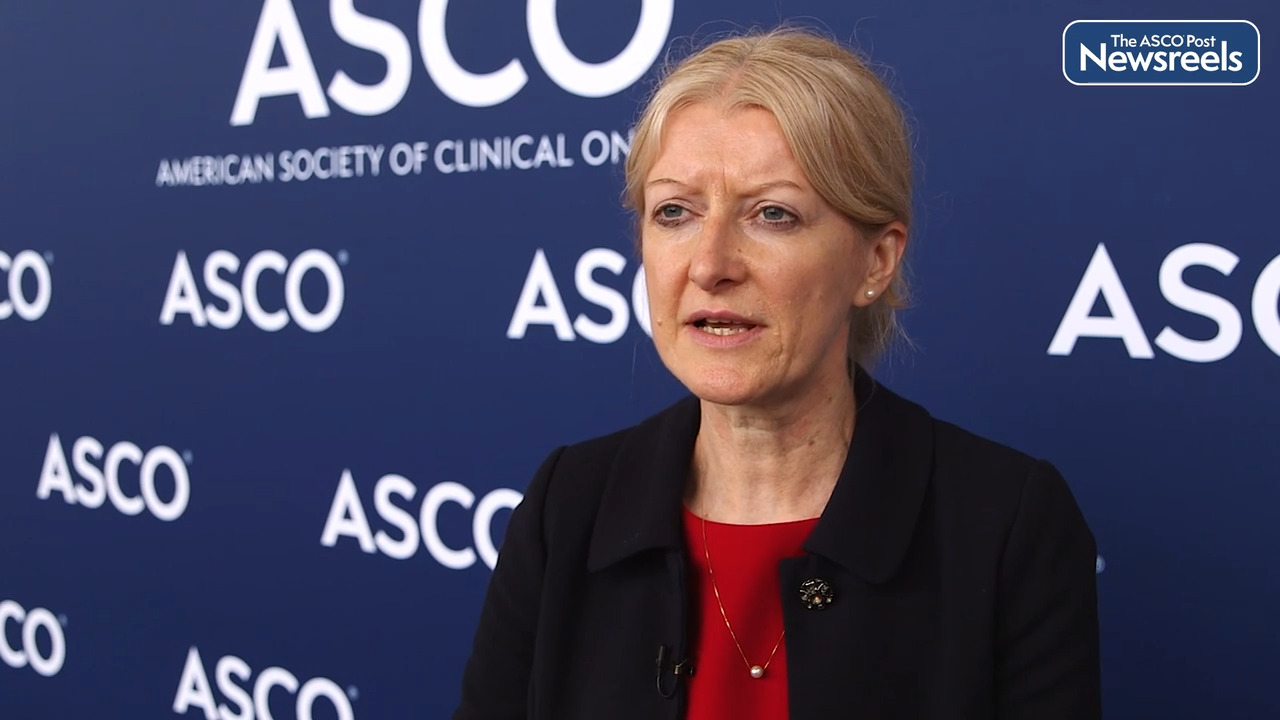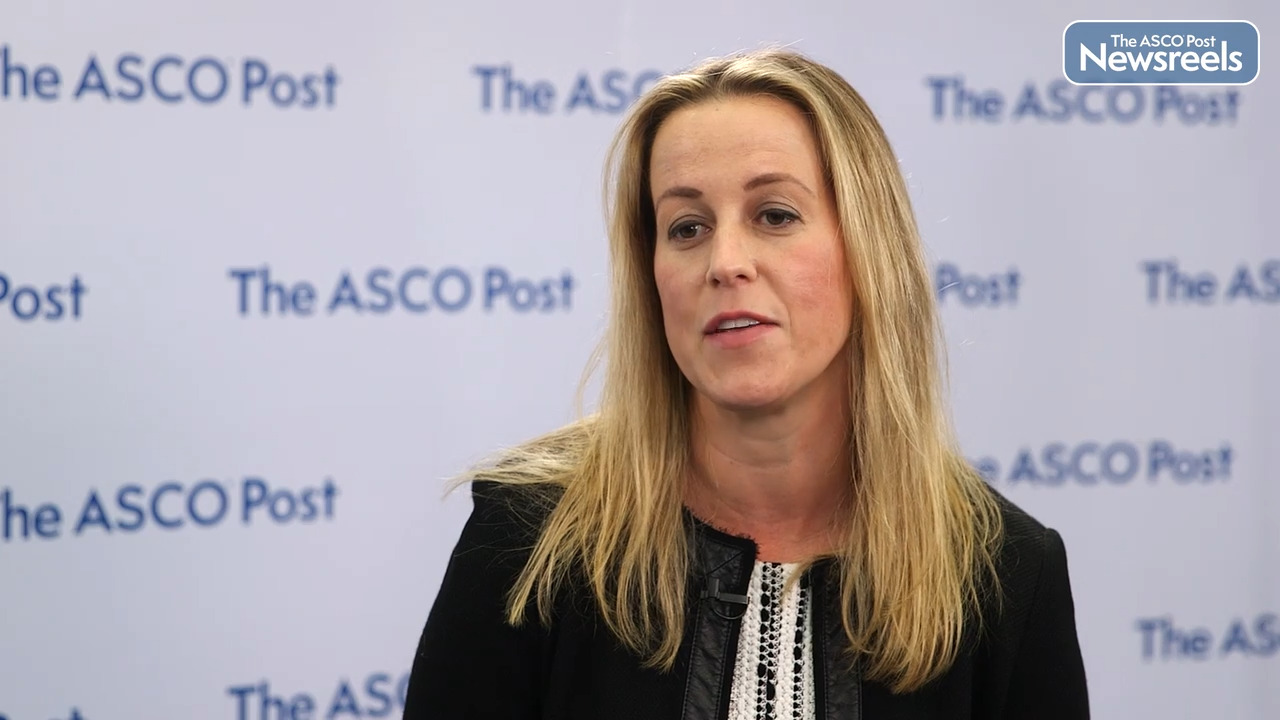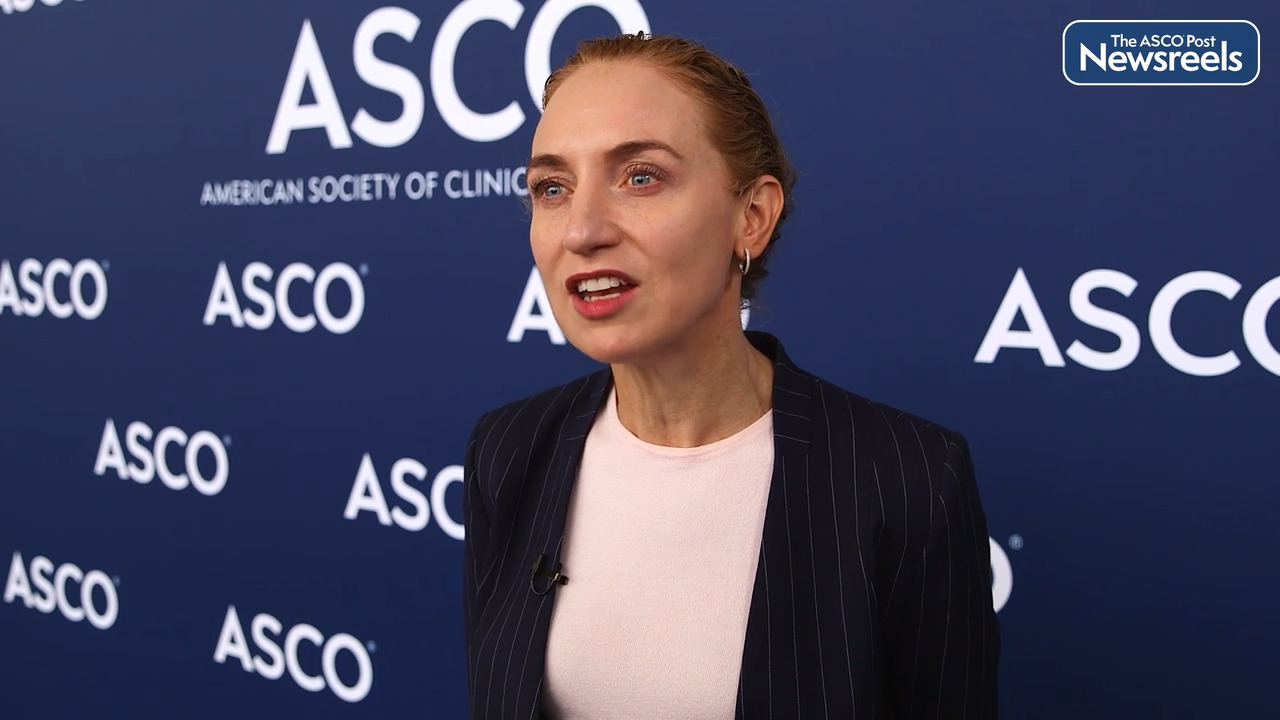Shilpa Gupta, MD, on Urothelial Cancer: Defining Who Is 'Platinum-Ineligible'
2022 ASCO Annual Meeting
Shilpa Gupta, MD, of the Cleveland Clinic Foundation, discusses an updated consensus definition for standard therapy and clinical trial eligibility for patients with metastatic urothelial cancer who are platinum-ineligible, criteria that are proposed to guide treatment recommendations for this population. This may be especially important now that the U.S. Food and Drug Administration has restricted the use of first-line pembrolizumab to those who are considered platinum-ineligible (Abstract 4577).
Transcript
Disclaimer: This video transcript has not been proofread or edited and may contain errors.
Frontline therapy for patients with metastatic urothelial cancer who are Cisplatin ineligible has continued to evolve. And the current standard of care is Gemcitabine and Carboplatin chemotherapy followed by durvalumab maintenance. In 2017, Atezolizumab and Pembrolizumab were approved as single agents for this patient population. But then the label was restricted to patients who are Cisplatin ineligible with high PD-L1 expressing tumors, or those who are not eligible for any platinum. And now Pembrolizumab use is only restricted to patients who are platinum-ineligible. Back in 2019, we presented results from our survey for defining platinum-ineligibility by sending a survey out to around 60 US-based medical oncologists. And we presented a consensus definition at GU ASCO that year. And now with the changing landscape, we updated the survey and used the similar cohort of responders to provide a consensus definition update. So we ask questions like: what equal performance status would physicians use to deem someone platinum-ineligible? What creatinine clearance cutoff would they use? What peripheral neuropathy cutoff, heart failure, cutoff? And in any person with ECOG performance status two, what would be the creatinine clearance cutoff? And based on the majority of responses, we found that most physicians found that creatinine clearance less than 30 milliliters per minute, peripheral neuropathy greater than are equal to grade two, significant heart failure that is NYHA class three or higher, equal performance status greater than our equal to three, and in a patient with equal performance status two, creatinine clearance of less than 30 milliliters per minute. Those were the factors that would make them hesitant to use Carboplatin. So we proposed that if any one of these criteria are met, that patient can be deemed as platinum-ineligible and be a candidate for single agent immunotherapy. Otherwise, we offered Gemcitabine and Carboplatin followed by durvalumab maintenance. Notably age was not a cutoff for these patients based on our survey.
Related Videos
The ASCO Post Staff
Mairéad G. McNamara, PhD, MBBCh, of The Christie NHS Foundation Trust, discusses phase II findings of the NET-02 trial, which explored an unmet need in the second-line treatment of patients with progressive, poorly differentiated extrapulmonary neuroendocrine carcinoma. In the trial, the combination of liposomal irinotecan, fluorouracil, and folinic acid, but not docetaxel, met the primary endpoint of 6-month progression-free survival rate (Abstract 4005).
The ASCO Post Staff
Michael J. Overman, MD, of The University of Texas MD Anderson Cancer Center, and Takayuki Yoshino, PhD, MD, of the National Cancer Center Hospital East, Japan, discuss results from the PARADIGM trial, the first prospective study to test the superiority of panitumumab vs bevacizumab in combination with standard doublet first-line chemotherapy for patients with RAS wild-type and left-sided metastatic colorectal cancer. The study showed that panitumumab improved overall survival in combination with mFOLFOX6, which may establish a standard first-line combination regimen for this population (Abstract LBA1).
The ASCO Post Staff
Rami Manochakian, MD, of Mayo Clinic Florida, discusses the phase II findings of the NADIM II trial, which confirmed that, in terms of pathologic complete response as well as the feasibility of surgery, combining nivolumab and chemotherapy was superior to chemotherapy alone as a neoadjuvant treatment for locally advanced, resectable stage IIIA non–small cell lung cancer (Abstract 8501).
The ASCO Post Staff
Erika Hamilton, MD, of Sarah Cannon Research Institute at Tennessee Oncology, discusses phase III data from the DESTINY-Breast03 study, which reinforced the consistent safety profile of fam-trastuzumab deruxtecan-nxki (T-DXd) vs ado-trastuzumab emtansine (T-DM1) in patients with HER2-positive unresectable and/or metastatic breast cancer. The findings also support T-DXd’s risk benefit over that of T-DM1 (Abstract 1000).
The ASCO Post Staff
Georgina V. Long, MD, PhD, of the Melanoma Institute Australia, The University of Sydney, discusses phase III findings from the KEYNOTE-716 study. The trial showed that compared with placebo, adjuvant pembrolizumab significantly improved distant metastasis–free survival in patients with resected stage IIB and IIC melanoma. The findings also suggest a continued reduction in the risk of recurrence and a favorable benefit-risk profile (Abstract LBA9500).





